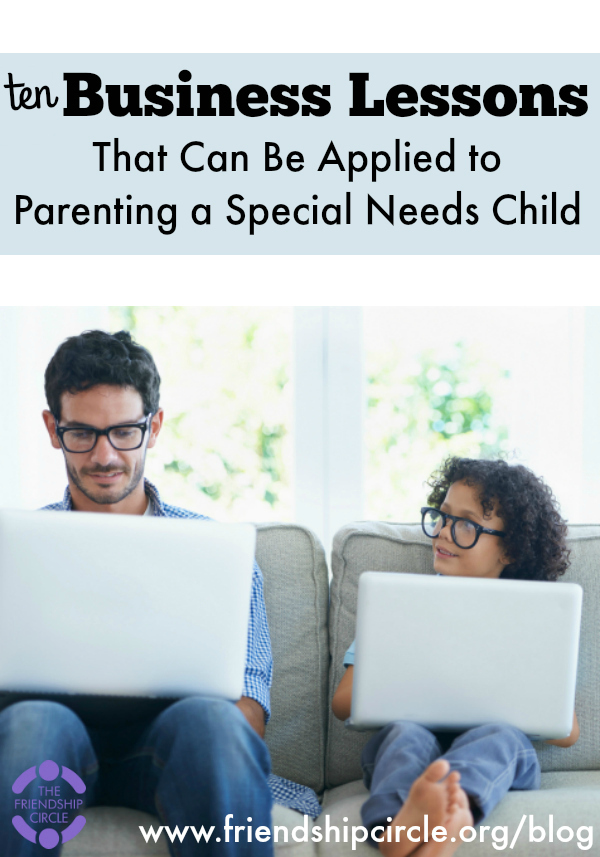
Parenting, Resources 
10 Lessons that Crossover from the Workplace to Raising a Child with Special Needs
One of my mentors early in my real estate career used to say “we don’t take ourselves seriously, but we take our business very seriously”. I really liked that – I felt it represents how I feel about life. I can be a goofball and fun-loving at times, but when it come to “getting it done” I’m really serious! Here is a list of 10 Lessons that Crossover from the Workplace to Raising a Child with Special Needs. I am sure there are more – please feel free to share them with me if you have input.1 | Setting Goals
In both parenting and business, it's important to know where we're going and what our intentions are. I find it important to write down a list of things I'd like to achieve so I know exactly what I’m aiming for. For parenting a child with special needs, it's important to set these goals so we can strive towards accomplishing them. I personally subscribe to a system called SMART Goals; you can find more info about SMART goals here.2 | Celebrating Small Victories / Celebrating Losses
Celebrating small victories are just as important as celebrating big victories. Rewarding ourselves and each other builds strength and reinforces the positive actions we take even when they are painful. It's also important to celebrate losses, too, because when we recognize a loss or a failure we have the opportunity to learn from it and keep it as a reminder of what not to do. As a real estate broker, knowing why someone gave me a listing and chooses to do business with me is just as important to me as knowing why I didn’t get the assignment. Both help me grow.3 | Perseverance
Sticking with it; sometimes things suck, sometimes I’m sitting in the middle of the crap pile, but I have to realize - it's just the moment. Getting through the hard times and having the perseverance to do so is how you get to the good times. I use a few different methods to get through the tough times, I have a great network of people who I surround myself with. I rely on them to remind me that the bad times are not permanent. I also like to keep focus on the long term. I wrote a blog on having a vision statement for my family – check it out here, it's helpful. Lastly, I run a facebook page called “we have more in common” where I spread information about us as humans being more alike than we are different. One of my favorite posts is a meme of a monk meditating on a rock by a river and it says “relax Nothing is under control”.4 | Dealing with Disappointment
Dealing with bad news or disappointment comes with the territory. It's how we react to it that makes the difference. For example, if I throw my hands up and just quit, I will have learned nothing, but if I map out a plan to work around the problem, and mold that plan to fit the end goal, I will walk away knowing that we came out ahead. Last weekend Sarah and I woke up at 5 am to pack up the car and the kids to take them to the NODCC conference in Chicago (the National Organization for Disorders of the Corpus Callosum is a Bi annual conference for people and families living with Agenesis of the Corpus Callosum. The main Diagnosis Ellah has). We went into Ellah’s room and she was in the middle of an episode of Cycle Vomiting syndrome (another ailment that she has). Needless to say, we had to cancel our trip to Chicago. We were all disappointed; her big sister was in tears. Ellah spent the next 3 days in the hospital and came home Saturday afternoon. As soon as I realized what was going on, I jumped into “positive spin dad mode”. I arranged for Na’amah to have playdates with her aunt and reminded her that we have 4 days at home, unplanned and the ability to do whatever we want. We had a great time at home, got some projects we had procrastinated on done, and made the best of what was not fun. It's sometimes hard to remember that as “not fun” as this was for us, Ellah had the brunt of it. Processing the bad news and disappointment at home and at work gives me the ability to roll with the punches and not get bogged down by it. Here is another blog post about how moms and dads react differently to bad news.5 | Routine and Discipline
In business and parenting, keeping a schedule is incredibly important. Forget not getting sucked into a Facebook hole for three hours daily, I’d never get anything done. But setting time aside to get things accomplished during my day is crucial. If I plan out my day and am meticulous with the tasks at hand, I’m more prepared to navigate my day with ease. It's also important to try and plan ahead, staying proactive, and thinking about what's coming up (or could come up) in the future. Two things I’ve started doing at work to are: 1) I turned off the e-mail and social media notifications on my phone. This way I only see updates when I check. 2) Rather than putting to do items on a list, I put them in the calendar. A 30 item to do list can be intimidating. But getting 3-5 items done in a half hour block is very realistic. If I schedule 4 or 5 of those, I can get a LOT done.6 | Setting Expectations
Setting expectations are extremely important. Here's what we're doing, here's how we're doing it - being transparent with everyone you come across. Or more specifically, “Ellah we’re going to the doctor, I don’t believe there’s going to be any ouchies today, but if there are, we’ll let you know beforehand.” There is no guide book for parenting or raising a child with special needs. So don't be too hard on yourself if those expectations change, it's inevitable! I like to call these “expectation conversations” both my kids and clients tend to appreciate them.7 | Having a Mentor or Coach
In business and raising a child with special needs, it's helpful to have someone to guide you. This could be conferences for business, or conferences for special needs - it's always beneficial to have the guidance of an experienced individual to help ensure you're headed down the right path. I have found personally that having someone with a roadmap to my situation is helpful. A mentor is someone who has done what I am trying to do and was successful at it. Why wouldn’t you want someone like that having your back?8 | Be Flexible with Strategy
Business says “fail early, fail often.” This is true for parenting as well; there’s no instruction book on how to be a parent (and ESPECIALLY not one for being a parent of a child with special needs). When something doesn’t work, change the strategy and try it again. Very often my wife and I sit and think we’re making the right decision, but we have no way of knowing. So, my response is always “regardless of whether this is the right decision or not, this is the best decision we can make with the information and tools that we have today and if tomorrow we have different information and tools, we can change the course.” In retrospect, there’s been a lot of great decisions and a lot of decisions that we would not make again but that’s okay because it’s experience.9 | Proactive Communication
I have a client that saw a sign on the door of my office that says “stay one step ahead of them; proactive follow up.” I do not wait for my clients to call asking for updates, I proactively send scheduled updates so that they never have to guess or wonder what’s going on. How this translates: we don’t like to surprise my older daughter (without special needs) when there’s issues with Ellah like going to the hospital, I’m not waiting until Na’amah gets home from school to discover that we’re not going to be there. I want to tell her “Ellah is sick, we’re going to the doctor, as soon as I know what’s going on, I will let you know.” Our concern was that this tactic would be worrisome for her, but what we discovered was that being treated like a human as opposed to a baby was a lot less chaotic for her than being surprised when no one is home.10 | Industry Events
Networking events and conferences. I go to real estate conferences to meet people in my business and get deals done, golf events, networking events – these are all standard practice in my business. The same is true for raising a special needs child. Conferences, parenting groups, medical events (depending on the needs) are all helpful. We are lucky here in the metro Detroit area to have the Friendship Circle which facilitates a lot of the parenting networking (they call it support, but I’m not picky).Can you think of any other lessons that could be applied to both parenting a special needs child and business? Leave them in the comments below!
Like this post? Pin it for later here:



